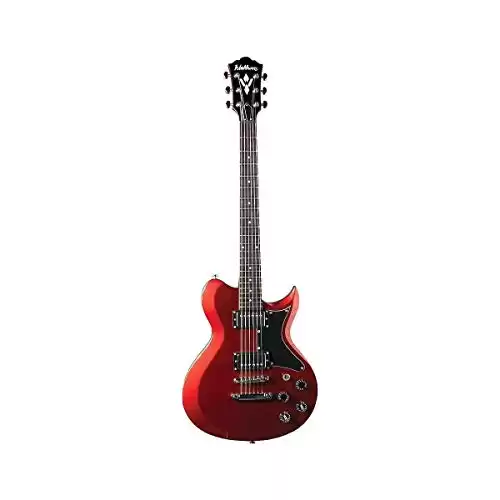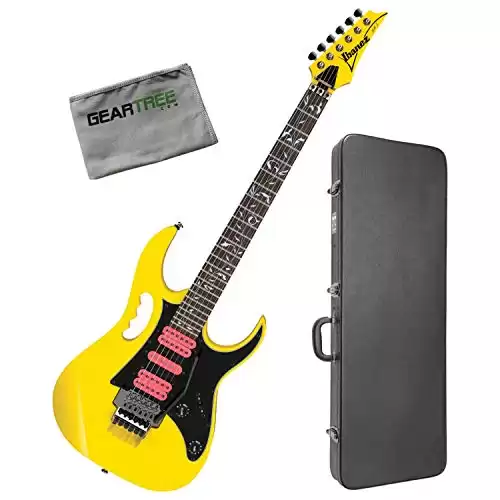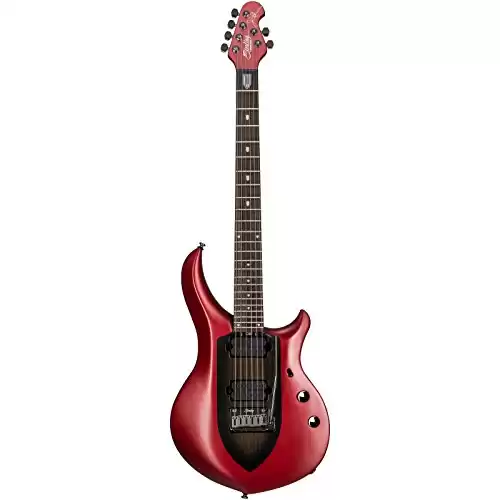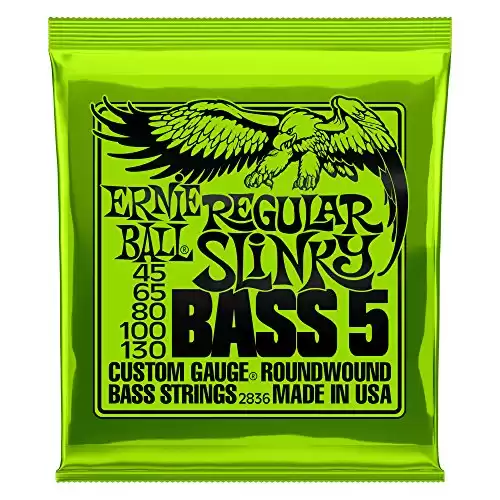Most woodcarvers enjoy having some basswood in their inventory. It provides an even texture, a little softness, with a fine grain that offers natural luster.
Basswood delivers a naturally pale color, making it receptive to different stains or treatments when creating a guitar body.
Although the material has some initial shrinkage to manage, the wood becomes stable once it is correctly seasoned.
If you put it under stress, the material remains stiff. It will rupture at a below-average tolerance, which is why some guitar manufacturers wonder if basswood is terrible for their designs.
What do you think? Is basswood bad for making a guitar?
Is Basswood Good for Guitar Bodies?
Basswood’s problem for guitar-making work is that the quality of the materials can vary significantly from piece-to-piece. That means you can sculpt a body that sounds fantastic if you get the right density and grain or create one that’s truly awful when it is too heavy.
When guitar manufacturers create a product using basswood, they prefer lightweight cuts better than the heavier ones.
More vibrations resonate within the lightweight material to generate warm tones and crisp notes.
Some people prefer mahogany, ash, or alder instead of basswood for their guitars. This choice is often a matter of personal opinion, although there is a practical feature to consider.
Basswood has more inconsistencies than the other wood species, creating less risk that a terrible instrument gets built.
Most budget-friendly or student guitars feature basswood for the body, which creates a secondary issue. Because the instrument is cheap, the perception is that the sound will not be as good.
If you play a high-quality basswood guitar instead of a learner’s model, your decision might swing in the other direction.
John Suhr frequently says that he likes a basswood body and a maple top for a guitar to create fuller sounds with impressive brightness.
Pros and Cons of Using Basswood for Guitars
Some people adore basswood guitars because of the throaty sounds and dramatic cuts that players can put into a composition.
Others hate it because the material has less versatility than other wood species, especially if you play multiple music styles.
Before investing in a basswood guitar, either high-end or starter models, a review of this material’s pros and cons is essential.
| Pros of Using Basswood for Guitars | Cons of Using Basswood for Guitars |
| Mid-grade basswood is one of the most affordable materials to use for guitar-making.It takes fine details well and sands easily.Basswood accepts paint and stains well to create individualized surfaces.Although it is soft and light, it is still classified as a hardwood species.The material rivals wood from spruce trees for general stiffness.It is useful for making electric, bass, and acoustic guitars. | Although basswood machines well, it can produce more errors than other species.It has a poor steam-bending classification that may increase the manufacturing cost.Low-grade basswood is cheap because it’s not useful for many things.The minimal grain creates an instrument body with little character. |
■ Why Choose a Basswood Guitar?
When guitarists can set aside their preconceived notions about basswood for a moment, one particular advantage becomes available for almost every instrument.
You rarely hear complaints about a guitar being too light, heavy, or unbalanced when it’s made with this material.
For manufacturers like Fender, basswood is close to alder when considering the weight of the instrument.
That’s when you’ll see it used as the primary material in some of the Japanese reissues in recent years in the bass line.
Although the material is affordable when purchased in bulk, you’re paying for the craftsmanship found in the guitar.
A starter set isn’t going to have the same composition as a high-end model.
You won’t find many manufacturers promoting the fact that they use basswood in their construction.
That’s done on purpose because people run away from this material as if it were going to kill them in their sleep.
Once you play a high-end guitar made from it, you’ll wonder why you ever had a problem.
How Much Does Weight Matter for a Guitar?
If you want to be successful with your guitar, the instrument’s weight must be your priority. Everything else connects to this one feature.
The instrument should feel like a natural extension of your body. Unlike exotic woods that often feel overbearing or non-existent, basswood models have the right depth and balance.
Picture-perfect designs and craftsmanship don’t matter if the guitar makes you feel uncomfortable when playing it.
Do you focus on the strap’s pull? Does the extra weight put pressure on your shoulders and neck to cause pain?
When a guitar is too light, the instrument’s body tends to slap against your body while playing. That issue creates unwanted sounds from it that you can’t quell with a palm or finger technique.
Having the body lift away in the middle of strumming can impact the quality of your playing.
Top Tips to Consider When Shopping for Basswood Guitars
When you want to find a basswood guitar that fits your budget, you’ll want to keep these tips in mind while looking at each instrument.
1. The Material Dents Easily.
You must be gentle with a basswood guitar. Although it is stiff, the softness of this hardwood causes it to pick up dings surprisingly fast.
You’ll want to grab a guitar with several protective coats to ensure that your instrument doesn’t look like it survived a traffic accident after the first few gigs.
2. Go with a Flat Finish.
Guitarists have a strange addiction to a glossy instrument finish. When you use high-quality basswood, it’s better to use a flat approach instead.
It’ll give you a smoother look, color consistency, and the option to use paint or stain. You also have the choice to put a light gloss on for a touch of sheen.
3. Stick with Solid Colors.
Basswood does better when you use solid colors to finish the guitar. When you have multiple hues and tones involved, even wood hardening products can’t deliver a successful outcome that prevents denting.
If you don’t like having a one-tone look, several manufacturers have developed some great sunburst designs that can serve as a practical alternative.
Don’t Confuse Basswood with Agathis
When shopping for budget-friendly guitars, you’ll find more Agathis wood available today than basswood.
Although low-end basswood is remarkably affordable, Agathis is even cheaper. That’s why brands from Fender to Ibanez use it to create entry-level instruments.
As with basswood, you can find some high-end products that also use Agathis wood.
The Washburn N-24 is probably the most famous example, but you can also see some of Steve Vai’s signature models built with this material.
If you’re unsure of how basswood stands up to Agathis wood, listen to the sustain from a simple chord.
The basswood sounds active and bright, while the Agathis wood lacks bite and distance.
You can overcome some of this issue by swapping out the pickups, but you negate the cost savings you’d achieve with an entry-level guitar.
What Guitar Brands Should I Buy for My Playing?
If you want to play some of the best basswood guitars that are being built today, you’ll find some brands tend to be better than others.
Although names like Fender dominate the industry, some of the best basswood guitars come from the Ernie Ball Music Man line.
If you’ve never played The Majesty before, you’re missing out on a treat!
Some of the models in John Petrucci’s signature collection have basswood, a maple shield or top, and mahogany throughout the guitar’s neck.
You’ll hear a lovely sustain, tone crispness, and brightness bordering on the edge of being sharp with the design.
Are you a bass player? If so, the Ernie Ball Music Man JP6 is an excellent guitar to play.
It’s 100% basswood, featuring a high-gloss finish with added durability build into the body.
It uses the scooped arm contour design to provide traditional lines, excellent balance, and tone depth that hits all of the right frequencies.
The basswood in the Ernie Ball Music Man guitars delivers the elegant nuances you can’t find in other materials.
You’ll also receive three-position pickup selections with active boosts to provide a 12-decibel switch for tone versatility.
If you try the Ernie Ball Music Man, don’t forget to use the company’s guitar strings to maximize your playing performance.
Basswood has a few issues, but those problems are easily overcome by craftsmanship and creativity. That’s why this material continues to be one of the industry’s top choices.






